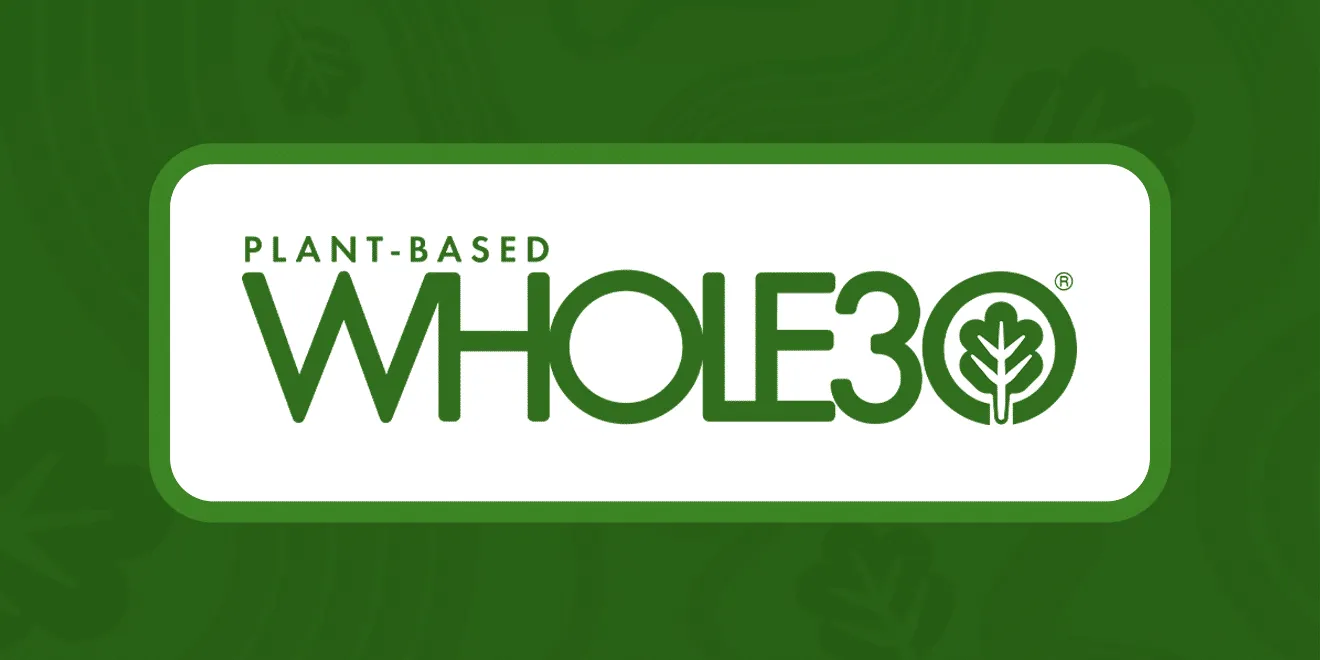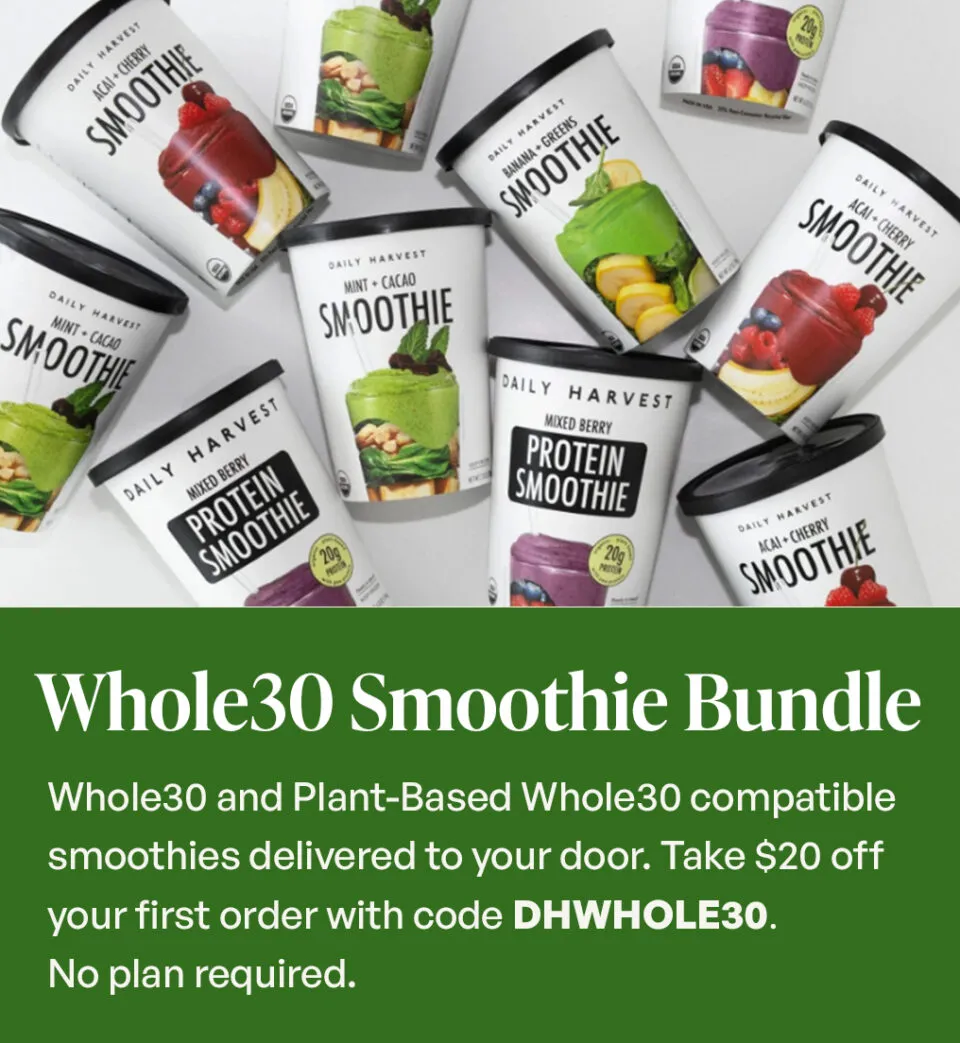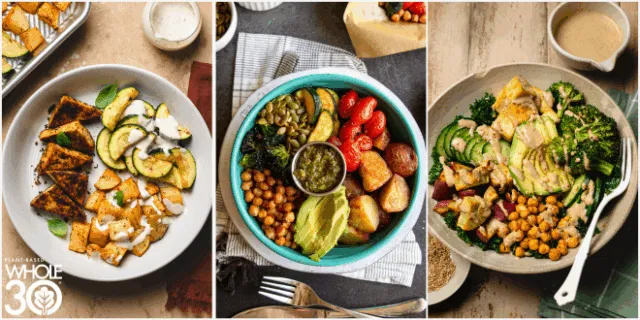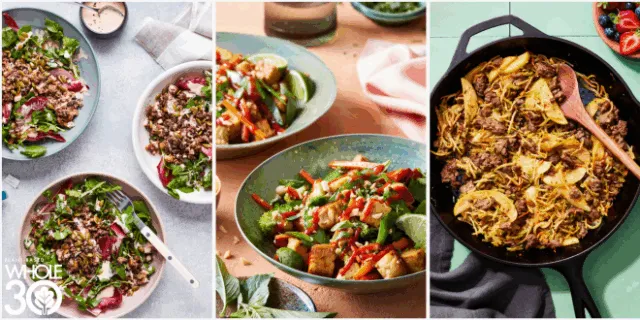If you’re following a plant-based diet, you might be wondering what plants have protein. It’s a good question—especially for those concerned about getting enough protein in their diet. However, there are plenty of high-protein plant-based foods that can help you meet your needs.
From beans and lentils to tofu, there are many delicious options to choose from. Incorporate these foods into your Plant-Based Whole30—as well as your plant-based Food Freedom—and you’ll be well on your way to meeting your protein goals.
How To Get Protein on a Plant-Based Diet
Choosing a variety of plant-based protein foods throughout the day is the best way to ensure you get the most benefits from your plant-based proteins. Each option you choose has an amino acid profile. Having a variety of these proteins throughout the day ensures all nine essential amino acids are consumed. It’s no longer recommended to combine all the essential amino acids at each meal, so you just have to have them all in a day.
For example, instead of choosing a tofu scramble for breakfast, baked tofu for lunch, and tofu skewers for dinner, add variety to your proteins. That means having tofu at breakfast, black beans for lunch, and lentils at dinner time.
Your List of High-Protein Plant-Based Foods
Knowing what plants have protein—and how much protein each serving contains—is as easy as bookmarking this page and following the list below. You will learn how much protein tempeh has, and what you can get from tofu, beans, lentils, and even proteins like lupini beans and soy nuts.
Let’s find out more about your options for high-protein plant-based foods to diversify your diet.
Tofu
Using tofu as a protein option during your Plant-Based Whole30 can be a great option to help you meet your protein goals. Tofu comes in different forms that can be used in a variety of preparations.
Tofu is made from soybeans, and is a high-protein plant-based food that’s low in carbohydrates. Super firm tofu has the most protein per serving, at about 14 grams. Extra firm tofu follows with a slightly lower protein amount of 9 grams per serving. Silken tofu has the lowest protein per serving—only 4 grams per serving.
Any type of tofu is a good source of iron, calcium, and magnesium. And it’s easy to add to your diet. Iron and calcium are particularly important in plant-based eating, but also should be considered in all patterns of eating. It’s estimated that the prevalence of anemia is between 2.2 % and 10.5% depending on age and gender.
Lupini Beans
These beans are gaining popularity in the United States—and for a good reason. A 1/2 cup serving of cooked lupini beans has around 100 calories and 13 grams of protein. This makes them a desirable high-protein plant-based food with low-calorie density.
These beans are part of the pea family and look similar to lima beans. Lupini beans are hearty with a firm texture. You can find them canned or dried in many large supermarkets or at a local Italian or Middle Eastern grocery store.
According to the FDA, people who are allergic to peanuts may have reactions to lupini beans. For those with nut allergies, please speak with your allergy specialist prior to experimentation. If you plan to make lupini beans from their dried form, ensure they are soaked very well before cooking. If they aren’t soaked enough they can be toxic. It’s strongly recommended to buy them already processed. But if you are going to cook dried lupini beans, please follow a recipe (like this one).
Tempeh
Tempeh is made from fermented soybeans and contains about 15 grams of protein per serving. It is another high-protein plant-based food that can be baked, cubed, and used in many recipes—such as this Tempeh Pineapple Stir Fry. Some tempeh may contain a grain medley, so be sure to read the ingredients list for wheat—especially if you are gluten intolerant, have Celiac Disease, or are doing a Plant-Based Whole30.
One huge benefit of tempeh is it’s fermented, which means it can support digestion and gut health. Fermented foods have probiotics (beneficial bacteria) that can have a positive impact on the gut microbiome. Tempeh also has prebiotics, which help feed the good gut bacteria.
Not only can it help keep your gut healthy, but it supports your bones, too. So, including tempeh is a great way to add calcium to your plant-based diet. One serving has nine percent of the recommended dietary intake (RDI) of this essential mineral.
Edamame
This type of young green soybean is harvested before it matures. So they’re green in color, and differ from mature soybeans, which are tan in color.
You can eat edamame as a snack sprinkled with nutritional yeast or mash them with avocado to make a topping for your plant-based chorizo wrap. Adding a high-protein plant-based food like edamame increases the total amount of protein in each of your meals. In a half-cup serving—about 78 grams—of edamame, there are roughly nine grams of protein.
Beans and Lentils
The most versatile and popular ingredient among plant-based protein options might just be beans and lentils. Not only are they popular in the United States, but these legumes are a staple all over the world.
Beans and lentils provide a great source of plant protein and have antioxidants, fiber, vitamins, and minerals. They can also be added to almost any dish for an extra plant-based protein boost.
It’s recommended to have at least 1 1/2 cups of beans or lentils per week to get the most health benefits. In a half cup of cooked beans, there are, on average, seven grams of protein. For a half cup of cooked lentils, there are 10 grams of protein—on average.
Soy Nuts
Soy nuts are the perfect option for a high-protein snack or as a salad or bowl topper. In a 1/4 cup serving, there are 11 grams of protein. These are roasted or baked soybeans. They taste similar to other soy products, but may have a slightly nuttier taste from being roasted.
These aren’t technically nuts, so they can be suitable for those who have peanut and tree-nut allergies. Baked soy nuts are the healthiest option for your plant-based diet. Avoid store-bought options that have been deep-fried.
Lower Protein Plant Foods
As you’ve read already, there are many plant-based foods that have plenty of protein in them. But not all plant-based foods are part of the protein category of your diet and meal planning. Although the protein in the foods you’ll read about below can add to your total, they have far less protein content than beans, tofu, and tempeh.
Here are some examples of low-protein plant-based foods (the protein amounts listed are for a one-cup serving):
- Raw spinach (1 gram)
- Broccoli (3 grams)
- Mushrooms (2 grams)
- Potatoes (3 grams)
Protein content aside, these foods should still be added to your diet. They are great sources of vitamins, minerals, and fiber that lead to many health benefits. Just remember they should not be counted on to add to your “protein” food category.
Plant-Based Whole30 Compatible Proteins List
Now you know the high-protein plant-based foods you can turn to during your Plant-Based Whole30 and beyond. And you know which foods might not be the best protein sources.
Hopefully this new knowledge will help in your meal planning and prep. To make your life even a little easier, you don’t have to memorize what plants have protein. Download the PDF linked above, bookmark this page, or copy and paste the list below into your Notes app. That will put the information about plant-based protein foods right at your fingertips whenever—and wherever—you need it.
- Lupini beans
- Edamame
- Tempeh
- Lentils
- Split peas
- Tofu
- Soy nuts
- Beans (black, red kidney, white, navy, lima, chickpeas, etc.)
- Unsweetened protein powder (see approved options)
- Nut and seed butter (hemp seed, peanut, tahini, pumpkin, sunflower, almond, and cashew)
- Abbot’s Butcher ground beef and chorizo















